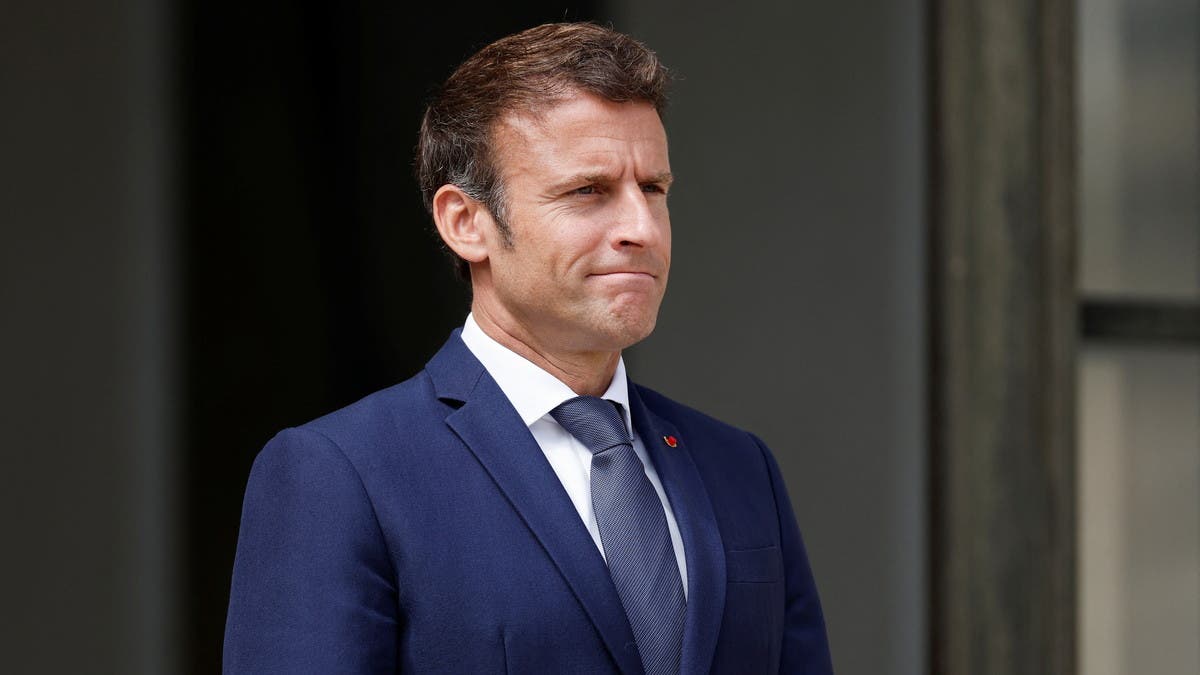Emmanuel Macron may be weakened at home after parliamentary elections forced him into political maneuvering, but on the international stage the French president has the resources to remain one of the most influential world leaders.
France’s foreign allies closely watched Sunday’s elections where Macron’s alliance won the most seats but lost its majority in the National Assembly, France’s most powerful house of parliament.
For the latest headlines, follow our Google News channel online or via the app.
The outcome has made the 44-year-old centrist’s life significantly harder at home, rendering the implementation of his agenda — such as pension changes and tax cuts — more difficult. Yet it is not expected to derail his international agenda in the immediate future.
Since Russia invaded Ukraine on February 24, Macron has been at the epicenter of international diplomacy surrounding the war. Despite a historic shift in French politics and growing polarization, experts don't expect that to change.
“There will be much more contrast between the pressure he might have at home compared to his freer rein abroad,” said Laurie Dundon, a France-based senior associate fellow with the European Leadership Network.
Macron, who is in Brussels for a two-day European Council summit, plans to be in Germany for a weekend Group of Seven meeting and in Spain for a NATO summit next week.
“I think that Europe does have a leadership," Macron said Friday in response to a question that referred to the situation at the French parliament. He noted that many nations in the EU are led by coalition or minority governments.
“I wouldn't oppose the political complexity of our countries … and European leadership. On the contrary, I think they reinforce each other. It just gives us more work" to find compromises, he said.
The French president holds substantial powers over foreign policy, European affairs and defense. He is also the commander-in-chief of the country’s armed forces.
France has provided significant financial and military aid to Ukraine since Russia invaded its neighbor. The French government also sent its troops to bolster Europe’s defenses on its eastern flank.
During France's presidential campaign, Macron’s popularity rose because of his leadership role in efforts to end the war: He championed tougher sanctions against Moscow while keeping an open line with Russian President Vladimir Putin, and has maintained near-constant contact with Ukrainian President Volodymyr Zelenskyy.
Macron, who won a second term against far-right candidate Marine Le Pen in April, traveled to Kyiv earlier this month, between the two rounds of the parliamentary election, along with other European leaders.
France’s support for Ukraine has wide domestic popularity, according to opinion polls, and opposition leaders have carefully avoided criticizing it.
The platform of the leftist coalition led by Jean-Luc Mélenchon, which has become France’s main opposition force, is explicitly in favor of Ukraine’s sovereignty and territorial integrity. On the far right, Le Pen, who long had ties to Russia, says she supports a “free Ukraine” while expressing reservations over arms deliveries.
“Foreign policy is not a realm where either Le Pen or Mélenchon want to expend their energy when they have so many domestic issues to challenge Macron on,” Dundon said.
“Neither one of them wants to get involved in the messiness of the diplomacy on Russia and Ukraine,” she said.
First elected in 2017, the staunchly pro-European Macron has never hidden his ambition for a leadership role in global diplomacy. His reelection in April bolstered his standing as a senior player in Europe as it faces the war in Ukraine and its consequences for the continent and beyond.
France’s strong presidential powers are a legacy from Gen. Charles de Gaulle’s will to have a stable political system throughout the Fifth Republic he established in 1958, after the post-World War II period experienced successions of short-lived, inefficient governments.
The president represents the country abroad, meeting with foreign heads of states and governments. It’s the prime minister, appointed by the president, who is accountable to parliament.
The National Assembly has negligible power over the president’s foreign agenda although it keeps control of government spending.
“Parliament has not been asked to give its opinion on the dispatch of arms to Ukraine, nor on France’s external operations, notably in the Sahel, in the Middle East as part of the anti-ISIS coalition, or in Afghanistan,” Nicolas Tenzer, Senior Fellow at the Center for European Policy Analysis, wrote.
Parliament must, however, give its authorization for an extension of these operations after four months, he stressed.
The emboldened opposition, both on the left and on the right, could seek to use parliament’s power to force a debate. Every week, lawmakers are entitled to question government members — but not the president — including about foreign policy. It’s an opportunity to raise criticism on key issues.
But the debate in France is widely expected to remain focused on domestic policies.
In a sign that the president’s attention might be shifting at least temporarily to political realignment at home, Macron hardly mentioned his international agenda on Wednesday when he delivered his first speech since the parliamentary elections. He only briefly referred to the European meeting focusing on Ukraine.
“I will have only one compass: that we move forward for the common good,” he told the French.
Read more:
French unions call for national rail strikes for better pay
Relations with France need to be ‘reset’: Australian PM
France seeks full gas reserves as Russia cuts supplies

 World3 years ago
World3 years ago
 World3 years ago
World3 years ago
 Business11 months ago
Business11 months ago
 Entertainment7 years ago
Entertainment7 years ago
 World7 years ago
World7 years ago
 Entertainment7 years ago
Entertainment7 years ago






